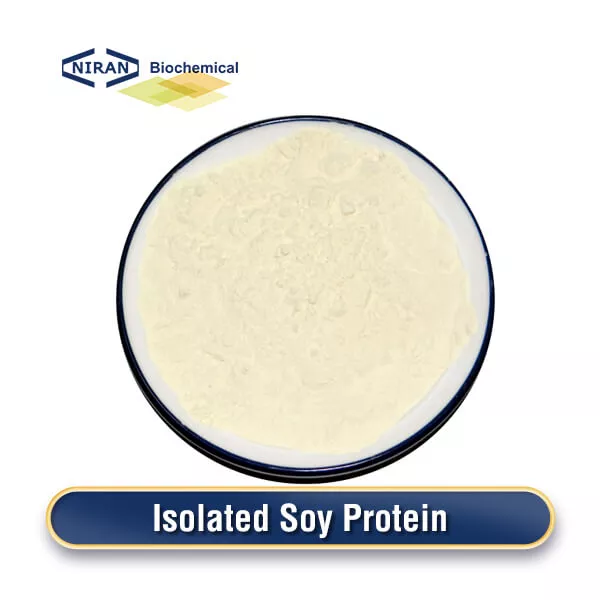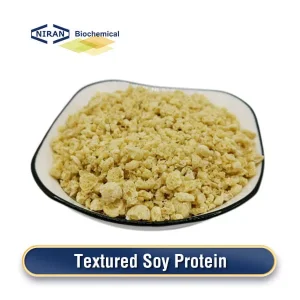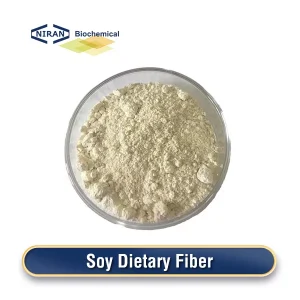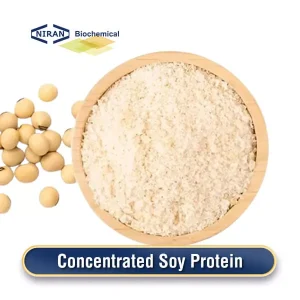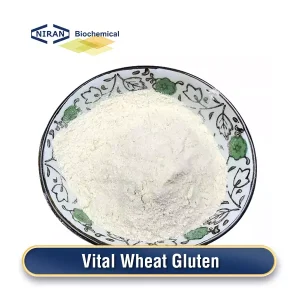Niran Biochemical
YOUR RELIABLE FOOD INGREDIENTS
Send Inquiry
Isolated Soy Protein
- CAS: 9010-10-0
- Chemical Formula:C13H10N2
- Certification: KOSHER, ISO, HALAL, FSSC22000, BRC, etc.
- MOQ: 1000KG
- Shelf Life: 2 Years
Inquire Product
Product Description
What Is Isolated Soy Protein?
Isolated Soy Protein: What Is It? A high-purity plant protein that is taken out of soybeans is called isolated soy protein. It is in the form of white or light yellow powder with excellent emulsification, gelling and nutritious properties. It is widely used in the food industry for the production of vegetarian meat products, soy milk, tofu and other products.
It is also used as a nutritional supplement in sports nutrition and infant food to meet the healthy choice of different groups of people for high-quality protein.
The main processes for preparing Isolated soy protein in China include the following two:
- Precipitate the protein in soybeans by adjusting pH or adding salts, and then separate and dry them, which is suitable for small-scale production or occasions with high environmental protection requirements.
- Use organic solvents such as isopropanol to extract protein from soybeans, which has high extraction efficiency and is suitable for large-scale industrial production.
The selection of a suitable process requires consideration of production scale, product requirements and environmental factors to ensure a balance between production efficiency and product quality.
Isolated Soy Protein (Emulsion Type 9001BW) Technical Data:
| Product Item | Result |
| Type | Emulsion Type 9001BW |
| Appearance | Light Yellow or Milky White Powder |
| Style | Dried |
| Taste and Smell | Normal Taste,without peculiar smell |
| Protein | Min.90%( on dry basis) |
| Moisture | Max.7% |
| Ash | Max.6% |
| Fat | Max.1% |
| PH Value | 7.5+1.0 |
| Fineness | Min.95%(Through 100 mesh) |
| Total Plate Count | Max.20000cfu/g |
| Microba & Bacillus Cereus | Max.100cfu/g |
| E.Coli | Negative |
| Salmonella | Negative |
| As | Max.0.5mg/kg |
| Pb | Max.0.5mg/kg |
| Hg | Max.10ug/kg |
Isolated Soy Protein (Injection Type 9020) Technical Data:
| Product Item | Result |
| Type | Injection Type 9020 |
| Appearance | Light Yellow or Milky White Powder |
| Style | Dried |
| Taste and Smell | Normal Taste,without peculiar smell |
| Protein | Min.90%( on dry basis) |
| Moisture | Max.7% |
| Ash | Max.6% |
| Fat | Max.1% |
| PH Value | 6.5+1.0 |
| Fineness | Min.95%(Through 100 mesh) |
| Total Plate Count | Max.20000cfu/g |
| Microba & Bacillus Cereus | Max.100cfu/g |
| E.Coli | Negative |
| Salmonella | Negative |
| AS | Max.0.5mg/kg |
| Pb | Max.0.5mg/kg |
| Hg | Max.10μg/kg |
Isolated Soy Protein (Injection Type 9020) Technical Data:
Recommended Dosage:
| Food name | Maximum usage(g/kg) |
| Vegetarian meat substitutes | 30-50g/kg |
| Soy milk and plant-based milks | 5-20g/kg |
| Soy products | 20-50g/kg |
| Vegetarian pasta | 10-30g/kg |
| Energy bars and nutrition bars | 30-60g/kg |
| Vegetarian sausages | 50-80g/kg |
| Plant-based yogurt substitutes | 10-30g/kg |
| Nutritious drinks | 5-20g/kg |
| High-protein drinks | 20-50g/kg |
| Protein-enhanced cereals and granola | 10-30g/kg |
| Nutritious catering foods | 30-60g/kg |
| Nutritious protein drinks | 20-50g/kg |
| Vegetarian sandwiches and wraps | 50-80g/kg |
| Nutritious salad dressings | 10-30g/kg |
Isolated Soy Protein Has A Wide Range Of Uses
- Boost nutritional value: Isolated soy protein has a high content of plant protein and is a good source of several important amino acids that the body needs. For vegetarians and others who need to up their protein intake, it’s a great substitute.
- Enhance food texture and taste: In vegetarian meat products, soy products (such as tofu, soy milk), plant milk, nutritional drinks and other foods, isolated soy protein can improve the elasticity and taste of their texture, making them closer to the taste of traditional meat or dairy products.
- Emulsification and stabilization: Isolated soy protein has excellent emulsification properties, which can help suspend and stabilize the oil and water phases in foods, such as dairy products, beverages, sauces, etc., to improve their taste and texture.
- Enhance the processability of food: In processed foods such as noodles, nutrition bars, energy bars, etc., isolated soy protein can enhance their processability and improve the product’s formability and morphological stability.
- Functional enhancement: Isolated soy protein not only provides protein nutrition, but also has gelling and thickening properties, which can be used to improve the texture and taste of food, such as being widely used in condiments, baked goods and frozen foods.
- Nutritional supplements and functional foods: As an important ingredient in nutritional supplements and functional foods, Isolated soy protein can help make high-protein drinks, nutrition bars and nutritious meals to meet the nutritional needs of different consumer groups.
User Asked Question:
Q: What is the difference and connection between food-grade soy protein and isolated soy protein?
A: Food-grade soy protein is a broad concept, including forms such as isolated soy protein and soy flour protein.
Isolated soy protein is a high-purity product obtained by extracting protein from soybeans and removing most of the non-protein components, usually containing more than 90% protein. It has excellent functionality, such as emulsification, gelling and stabilization, and is often used in the production of various foods, such as meat substitutes, soy products and nutritional drinks.
Soy flour protein contains more non-protein components, with slightly different uses and functions, and is commonly found in whole bean products, such as soy milk and tofu. In general, soy protein isolate is a highly purified form of soy protein and is widely used in the manufacture of high-protein products in the food industry.

